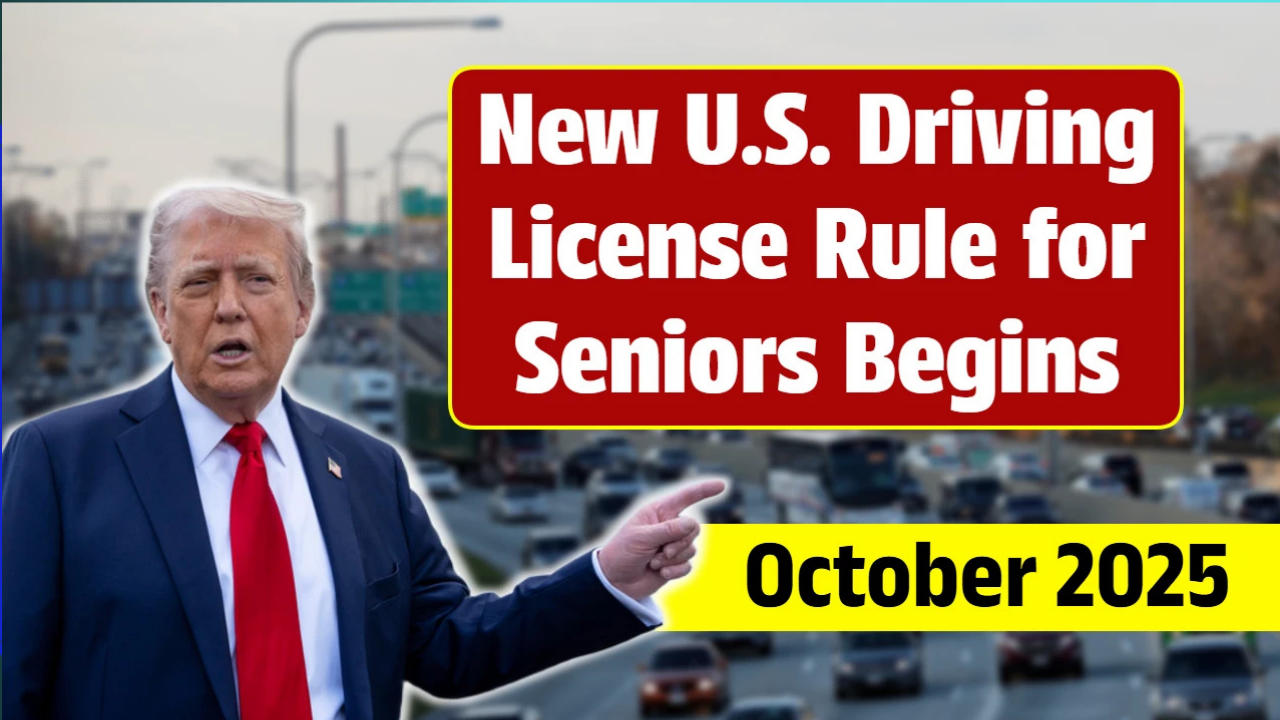New U.S. Driving License Rule:Starting in October 2025, a major change is coming for senior drivers across the United States. The Department of Motor Vehicles (DMV) has implemented new driver’s license rules for drivers age 70 and older, aimed at improving road safety and ensuring older drivers maintain confidence and competence behind the wheel.
This new policy has sparked discussion across the country – while many consider it a necessary step to protect all road users, some are concerned about the impact it will have on the independence of older Americans. Whether you agree or not, one thing is clear: every senior driver needs to understand what’s changing.
U.S. Citizens to Receive $2,000 Direct Deposit in October 2025: Eligibility, Payment Dates..
Why the New Rule Is Being Implemented
Over the past decade, studies have shown that road accidents involving older drivers have steadily increased—not because older people are careless, but because changes in vision, reflexes, and hearing that come with age can affect driving ability.
In light of this, the National Highway Traffic Safety Administration (NHTSA) and state DMVs have collaborated to update licensing procedures for people aged 70 and older to ensure they remain safe and confident on the road and reduce the risk of accidents.
Officials have emphasized that the rule is not intended to take away anyone’s independence, but rather to provide support and evaluation so that older people can continue driving safely for as long as possible.
Key Changes in the New Driving License Rule
Beginning in October 2025, drivers aged 70 and older will face a few important updates during license renewal. While exact details vary slightly by state, the following changes apply nationwide:
1. Mandatory In-Person License Renewal
All senior drivers must renew their licenses in person — online or mail renewals will no longer be accepted for this age group. This change ensures that physical and cognitive assessments can be carried out properly.
2. Vision and Reaction Time Testing
During renewal, seniors will undergo:
-
A vision test to ensure they meet the required standards for safe driving.
-
A reaction time and coordination assessment, which evaluates how quickly and accurately a driver responds to sudden changes on the road.
These tests are simple, short, and designed to identify any early signs of difficulty that could compromise driving safety.
3. Medical Certification for Certain Conditions
Drivers with medical conditions that can affect alertness, movement, or reaction times — such as diabetes, heart conditions, or Parkinson’s disease — may be asked to submit a medical fitness certificate from their doctor.
This certification ensures the DMV has up-to-date information about a driver’s health before renewing the license.
4. Shorter License Validity Periods
Instead of the usual 8- or 10-year validity, licenses for seniors may now be valid for 3 to 5 years, depending on state regulations. This allows regular check-ins to ensure drivers maintain safe capabilities over time.
5. Optional Refresher Courses
Many states are introducing voluntary safe driving refresher programs for seniors. Completing such a course may qualify participants for auto insurance discounts or even an extended renewal period in some states.
How senior citizens can prepare for the October 2025 rule
If you are approaching or have reached the age of 70, here are some things you can do to make this transition easier and stress-free:
- Get your renewal done early. Don’t wait until the last month—demand is expected at DMV offices this fall.
- Have your vision checked regularly. See an ophthalmologist and make sure your corrective lenses meet current driving standards.
- Stay active and alert. Regular exercise and mental activities like puzzles or reading can help maintain alertness and focus.
- Take a refresher course. Local driving schools and AAA chapters often offer senior safety classes tailored to your needs.
Why This Rule is Beneficial for Everyone
Although the new rule adds some additional steps, it ultimately promotes safety—not punishment. It ensures that older drivers remain competent and that families can feel confident when their loved ones are behind the wheel.
Furthermore, with improved assessment and educational resources, senior drivers can continue to enjoy their independence while reducing risks to themselves and others on the road.
FAQs
1. When does the new rule take effect?
The updated license renewal requirements for seniors take effect nationwide in October 2025.
2. Can seniors renew their licenses online or by mail?
No. All renewals for drivers aged 70 and above must be completed in person at a DMV office.
3. What tests will be required during renewal?
A vision test and a reaction time assessment are mandatory. Some states may include brief cognitive or physical fitness evaluations.
4. Will seniors lose their licenses if they fail the test?
Not immediately. Drivers who don’t meet the requirements may be asked to retake the test, submit medical clearance, or complete a refresher driving course before reapplying.
5. How long will the new senior licenses be valid?
Most states will issue licenses valid for 3 to 5 years for drivers over 70.
6. Are there benefits to taking a senior driving course?
Yes. Completing a state-approved course can improve safety awareness and may even lower insurance premiums.

